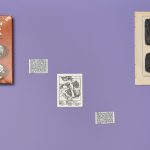Through spatial installations and found objects, Meriç Algün addresses issues of identity, borders, language, and relationships. Her early works deal with the experience of the distinct social and political differences between her birthplace Istanbul and hometown Stockholm, and of the authoritarian bureaucracy many people encounter when crossing national borders. Algün’s artistic method usually begins with research or personal experiences, leading to works that serve as archives of worldviews and modes of thought with idiosyncratic logical systems. She has compiled a dictionary of the 1,270 words common to the Turkish and Swedish languages (Ö (The Common Letter), 2011); bound together all the world’s visa applications into an encyclopedic volume (The Concise Book of Visa Application Forms, 2009); and authored a novella with sample sentences from The Oxford English Dictionary in A Work of Fiction (2013). Common to these works are documents that have a specific function in society, but often remain unchallenged as seemingly self-evident, natural or neutral. By toying with the formats of the dictionary, encyclopedia, and novella, Algün casts light on their underlying mechanisms and normative systems.
Continental drift and the origin of human desire
Separation, desire, and relationships are central concepts in the works presented in this exhibition. In the installation A Glossary of Distance and Desire (2019/2023), which lends the exhibition its title, about a hundred objects are placed on colorful podiums of geometric shapes. The installation is a playful approach to creating a vocabulary for speaking of love, desire, and separation. Among the objects are fossils, pictures, books, sounds, and dictionary clippings. The work includes a copy of Roland Barthes’ A Lover’s Discourse from 1977, which reflects on the paradox of love through distance and describes attraction as something arising in the separation between oneself and the Other. Since the beloved is, by definition, someone other, and beyond the limits of our own being, the impossible desire to become one arises. Canadian poet Anne Carson’s book of essays Eros the Bittersweet from 1986 has also impacted Algün’s artistic practice. On one podium lies a spread from the book which begins with the following lines:
Eros is an issue of boundaries. He exists because certain boundaries do. In the interval between reach and grasp, between glance and counterglance, between ‘I love you’ and ‘I love you too,’ the absent presence of desire comes alive.
Based on the idea that desire originates in distance and separation, the artist draws parallels to the geological hypothesis known as continental drift. According to this, the Earth’s outer shell consists of tectonic plates that are in constant slow motion. Central to the hypothesis is that continental drift creates mountain ranges when plates collide and a World Ocean when they tear apart, which in turn causes earthquakes and volcanic eruptions. Drift is cyclical, whereby all the world’s land mass periodically unites in a supercontinent. The seven podiums refer to the world’s continents but borrow their shapes from tangram. Tangram is a puzzle with a thousand-year history that originally comes from China. The challenge is to assemble the seven pieces with specific shapes into various figures. Much like tangram pieces, the podiums can be united into one square, but are in the exhibition space separated and spread out. Together with the podiums, the objects form a spatial glossary of separation and attraction. The visitor is invited to associate freely and make their own connections between the works’ objects, similar to putting words together to form sentences or tangram pieces to form figures.
The impossible, but eternal, dream of total union
The work Eternity 1988–∞ (2019–ongoing) consists of a collection of full-page advertisements for Calvin Klein’s perfume Eternity. During the 35 years Eternity has been marketed, the American model Christy Turlington has been the face of the perfume. In the ads, Turlington is portrayed with various men and children to represent her happy family. Since 2017, she is portrayed next to her real-life husband. Eternity 1988–∞ is a poignant reminder of how capitalism can profit on our constant longing for eternal love. This longing is packaged in pleasant, marketable concepts, whose continued success is dependent on never being satisfied. If passion and desire are sprung from the beloved’s attribute as the Other, the total union with our beloved becomes an eternal pursuit of an impossible dream. Installed in one of the visitor restrooms, the new sound piece Eternity (Forever) (2023) is played on a loop. The work is a montage of soundtracks from commercials for Eternity. Expressions of love and promises of eternal faithfulness are interspersed with singing, waves, and dreamy memories of union. French philosopher Alain Badiou’s quote below is taken from the foreword to Byung- Chul Hans’s The Agony of Eros, 2017, found on one of the podiums. It describes how attempts to package love for capitalist purposes are inevitably paradoxical in nature, as love is a radical experience of the Other.
In truth, love refuses to accept all such norms of the contemporary world – the world of globalized capitalism – because it is not a simple pact of pleasant coexistence between two individuals; rather it is the radical experience, perhaps to the outermost point, of the existence of the Other.
Algün’s three works linger in the unpredictable uncertainty of love, which can appear both alluring and alarming. The works draw parallels between our destructive attempts to control, own our desire and the exploitive side of mankind’s relationship with nature. Like the object of love, nature possesses the inescapable quality of being something distinctly other than ourselves. The exhibition Meriç Algün – A Glossary of Distance and Desire can be seen as a defense of the unfathomable nature of love and how acceptance of the uncontrollable is its prerequisite.
Sofia Ringstedt
Curator
Curatorial essay from Magasin III



